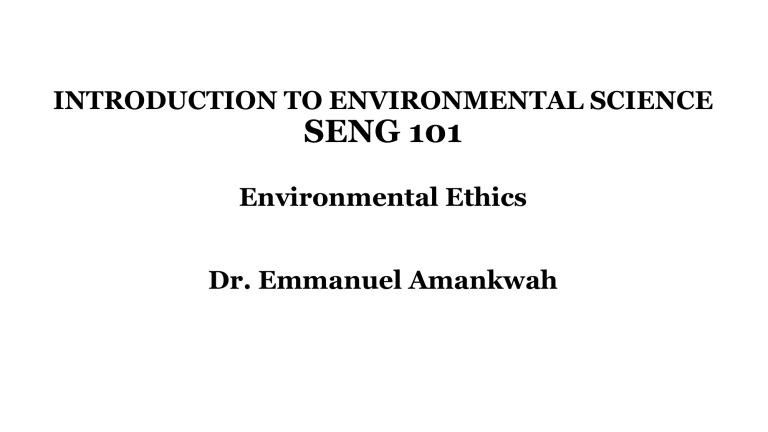
INTRODUCTION TO ENVIRONMENTAL SCIENCE SENG 101 Environmental Ethics Dr. Emmanuel Amankwah Environmental Ethics It is a branch of philosophy which seeks to define what is right and what is wrong. It studies the moral relationship of human beings to the environment and what actions are wrong and why they are wrong Environmental ethics focuses on the moral foundation of environmental responsibility and the extent of that responsibility. Not all cultures agreed to the principle of ethical commitment but we all have the moral responsibility to deal with the major environmental problems that result from our resource exploitation. As in Basic human right where the UN declared universally in 1948, the same should also be done for the environment globally. This will help preserve the environment for posterity. Ethics and Laws In many countries laws are changed to match the ethical commitment of that countries even though not every ethical right will have law supporting it. However, certain things are ethical but cannot be backed by law but it should be left to the discretion of the individual especially the environment. Peoples’ custom, habit, social and economic status, etc. influences their level of ethical commitment. Making ethical commitment is very complex and conflicting since what is good for people may conflict with what is good for the environment. For instant, saving the forest or water bodies may conflict with providing logging or mining jobs for the youth. Ensuring a win-win situation for the environment and the people’s welfare is very important. Theory of environmental responsibility 1. Anthropocentrism (human centered ethics) – They view the environment from human interest alone. It promotes human interest at the expense of all environmental factors. They do not think about future consequences but the short term benefit of man. Theory of environmental responsibility Ecocentrism (environment centered) The environment deserves direct moral consideration derived from human and animal interest. They also believe that the physical environment also has right thus the preservation of the ecosystem should be our priority Theory of environmental responsibility Biocentrism (life centered) believe that all forms of life have an inherent right to exist. And we have responsibility to protect all life forms Other Philosophical Approaches Ecofeminism – concern about how society treats women and the environment Social Ecology – strong supporters of environmental justice movement which seeks for a fair treatment of the environment and its species. The poor and the rich. Deep Ecology - believes that a sense of oneness with the earth is the essential for a healthy relationship with the environment. Other Philosophical Approaches Environmental Pragmatism – believes in policy than ethic and think human-centered ethic with long-range perspective will amount to environmental policy as an ecocentric ethic. Environmental aesthetics – such think that the most effective philosophical reason for protecting the natural environment is the preservation of its beauty Animal rights/welfare – they assert that humans have strong moral obligation to nonhuman animals especially the treatment of farm animals and animals used in medical research. Environmental attitude/approach 1. Development approach (anthropocentric)– it suggest that human race is the master of the earth and can convert it to the benefit and pleasure of man. Man therefore convert natural resources into marketable products through industrialization and modernization to improve human conditions. 2. Preservation (ecocentric) – they want large portion of natural resources preserved instead of conversion to human use. Nature should be preserved for its beauty and recreation. 3. Conservation approach – the tend to strike the difference between unrestrained development and preservation. They believe in human good but also advocate for the proper environmental management. This approach is modernized as sustainable development. Our responsibility We form part of the web of life and thus the need to keep its vital systems sound and safe. Depletion of the natural resources will have future consequences. Our ancestors instituted many cultural practices to protect and preserve natural resources. Society, corporate bodies and individuals have a responsibility to ensure sustainable development and use of natural resources. 10 Social Environmental Ethic Societal environmental ethics expressed as a product of decisions and choices made by a range of societal actress including individuals, businesses and national leaders. However, until the 20th Century, developed nations have grown their economy with less regard for the environment. There has been unsustainable use of non-renewable resources to make life comfortable for homes, transport, well equipped hospitals, etc. through economic growth and resource exploitation. Developing nations are therefore now limited from following the same pattern of development. Corporate Environmental Ethnics The primary purpose of businesses is not to benefit public or to protect the environment but to generate financial return for its shareholders. The ethical commitment of corporations is really enforced when shareholders, executives, employees demand that from the directors. Corporations face real choice between using environmentally friendly or harmful production processes to make profit. Due to pressure from society, businesses are forced to adopt more environmentally and socially responsible practices. Individual Environmental Ethic Businesses and societal environmental ethics begin with the individuals to ensure environmental quality. Individual lifestyle changes and behavioural choices can make significant difference in the health of the ecological system. Environmental ethics must not be limited to government, businesses but individual levels. Resource Consumption Developed countries consume more food than sub-Saharan Africa North Americans are only 5% of the world population but consume over 25% of the world oil resources They use more water, energy, natural resources They waste more food than most people in Sub-Saharan Africa can eat Have access to better facilities Resource Consumption Developed countries, while smaller in size and growth, consume resources at a greater rate. About 20% of the world’s population uses 75% of its resources. Developed countries on average have higher incomes, longer life spans, and slower growth rate. These countries are more economically stable, educated, and have more environmental protections


